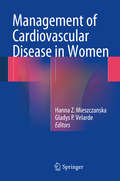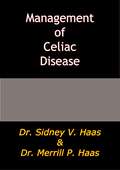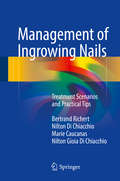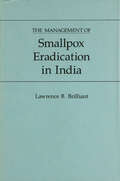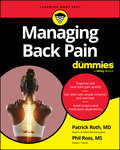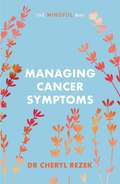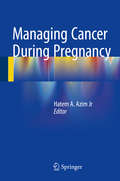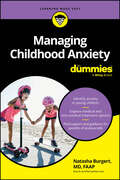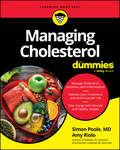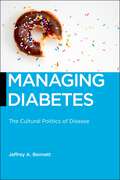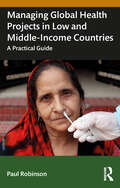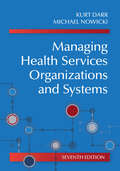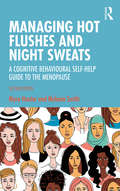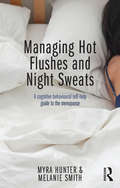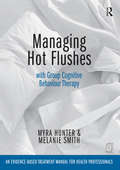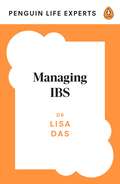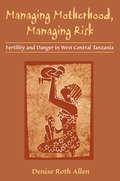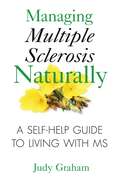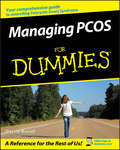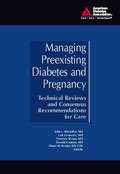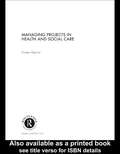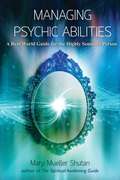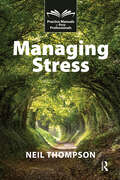- Table View
- List View
Management of Cardiovascular Disease in Women
by Hanna Z. Mieszczanska Gladys P. VelardeCardiovascular disease is the leading cause of death in women in the US, with more women dying from heart disease than men. Women may have different presentation from men and often need a different approach to diagnosis and treatment. There are also unique topics of management of heart disease in women, including issues during pregnancy, lactation, and menopause. Many different health care providers, as well as cardiologists are involved in treating these patients. A manual reviewing diagnosis and treatment of cardiac disease in women would help providers without specific cardiology training to deliver care with greater efficiency. A practical and comprehensive guide geared towards these providers would be a highly practical and valuable resource that would be utilized in everyday practice in offices that include urban clinics, general medicine offices, obstetrics and gynecology offices, as well as in the surgical subspecialties. This book will be a highly practical resource that can be directly applied to the issues that arise in everyday practice. There is no available book on the market that focuses on a broader approach to cardiac disease in women or focuses on non-cardiology providers (and their trainees) who have the need to know more about treatment of cardiovascular disease in women.
Management of Celiac Disease
by Dr Merrill P. Haas Dr Sidney V. HaasOriginally published in 1951, this book by Dr. Sidney V. Haas, who introduced banana feeding in the therapy of celiac disease, and his son, Dr. Merrill P. Haas, represents the most extensive report published at the time on the subject.The first two-thirds of the book deal with the historical aspects of the problem, the various theories of etiology, and the methods of treatment proposed by different workers in the field.The final part of the book is devoted to the authors’ own experience and opinions, with comparisons of therapeutic results and prognosis on the basis of differences in dietary management.“[T]he subject is treated comprehensively and objectively. The writers’ style is clear and direct, and their approach to controversial aspects of the problems of celiac disease is fair and judicious.”—JAMA Internal Medicine, January 1952
Management of Ingrowing Nails
by Bertrand Richert Nilton Di Chiacchio Marie Caucanas Nilton Gioia Di ChiacchioThis book discusses all therapeutic options regarding ingrowing toenails, from conservative to surgery. No single technique is promoted, but arational approach according to the clinical presentation is proposed. Theauthors have a wide experience in nail surgery and master all publishedprocedures. In this book they offer to the reader an algorithm of themanagement of ingrowing nails, as there is no "cure-all" procedure.
Management of Smallpox Eradication in India
by Lawrence B. BrilliantDoctor Lawrence Brilliant and Doctor Isao Arita, Chief, Smallpox Eradication Programme, World Health Organization, Geneva, Switzerland, visited West Bengal during the autumn of 1973 in order to initiate the first trial of the smallpox eradication program, namely, a statewide search for hidden cases in a population of sixty million. Eighteen months of intensive work produced a final result of the recording of the last smallpox case in India; the date of onset of rash was May 24, 1975. No more cases have been detected.
Managing Back Pain For Dummies
by Pat Roth MD Phil Ross MSDiscover countless options for rest and relief when you have chronic back pain You're probably not thrilled that you need a book called Managing Back Pain For Dummies, but you'll be thrilled that you bought it. Written by a neurosurgeon and a master personal trainer, this book contains expert advice that will help you feel better. You'll get step-by-step guidance on how to lessen your pain and reduce reliance on medication, using self-treatments and exercises that really work. You'll also learn about the clinical treatments that are available to treat back pain—and when it's time to seek a doctor's help. Back pain is different for everyone. You might benefit from simple posture fixes and at-home exercises, or you might be ready to pursue injections, nerve blocks, and other medical treatments. Wherever you are on the back pain spectrum, this helpful Dummies guide will help move the needle toward relief. Prevent and reduce back pain by improving your posture and technique during daily activities like yard work Understand the latest professional treatments and self-treatments, and know when to see an MD Reduce your reliance on medication by exploring our methods of stimulating self-healing and permit the body to heal itself. Follow clear, concise, illustrated exercise routines designed to strengthen your core and support muscles of the spine. This book is for the millions of people who are struggling with back pain and looking for non-surgical options to improve their quality of life.
Managing Cancer Symptoms: The Mindful Way
by Cheryl RezekHaving cancer can leave you feeling vulnerable, despairing and scared. Managing Cancer Symptoms: The Mindful Way can't give you a cure, or make false promises, but it can help you to navigate the good, the bad and the horrible parts of this new landscape. Mindfulness has been proven to help with the symptoms of cancer, and in this book you can find mindfulness practices that will help you with things like sleep, stress and pain management. Some simple movement and walking meditations will help you physically while self-care meditations will help you to nurture yourself with compassion and kindness. When things are tough or life feels unbearable, this book will help you forge an anchor, keeping you grounded and calm, living your life one breath at a time.
Managing Cancer Symptoms: The Mindful Way
by Cheryl RezekHaving cancer can leave you feeling vulnerable, despairing and scared. Managing Cancer Symptoms: The Mindful Way can't give you a cure, or make false promises, but it can help you to navigate the good, the bad and the horrible parts of this new landscape. Mindfulness has been proven to help with the symptoms of cancer, and in this book you can find mindfulness practices that will help you with things like sleep, stress and pain management. Some simple movement and walking meditations will help you physically while self-care meditations will help you to nurture yourself with compassion and kindness. When things are tough or life feels unbearable, this book will help you forge an anchor, keeping you grounded and calm, living your life one breath at a time.
Managing Cancer during Pregnancy
by Hatem A. Azim JrThis book provides hands-on information on how to manage pregnant cancer patients in clinical practice. In this context a multidisciplinary perspective is essential, and contributions are accordingly presented from experts in surgical management, medical oncology, radiotherapy, pharmacokinetics, obstetric care, psychological care, neonatal and pediatric care. In addition a series of chapters focused on management in particular disease settings are presented, including breast cancer, melanoma, cervical cancer, ovarian tumors, lymphoma, leukemia, and thoracic cancers. The book reflects the major progress that has been achieved in the care of pregnant cancer patients in the recent years as important data have become available on patient management, and fetal safety in addition to valuable preclinical research on the impact of pregnancy on pharmacokinetics of anti-cancer agents. Edited and authored by worldwide leaders in the field, it will serve as a valuable resource not only for oncologists but also for obstetricians, gynecologists, neonatologists, and pediatricians caring for pregnant cancer patients and their newborns.
Managing Childhood Anxiety For Dummies
by Natasha BurgertUnderstand what child anxiety is, how to treat it, and how to support and encourage anxious children Anxiety is the most common mental health condition in young children. Managing Childhood Anxiety For Dummies is the go-to resource for parents of young children who suspect their child may be experiencing anxiety but aren't sure where to start. Learn to recognize the symptoms of anxiety in kids who may be too young to explain how they're feeling and get expert advice on supporting them with proper treatment and guidance. Find answers to questions like: When is worry normal, and when it is a sign of anxiety? Which interventions are most effective for anxious kids? How can I make my home or classroom less stress inducing? Written by an experienced pediatrician, this compassionate book challenges harmful taboos about mental health and equips you with the tools you need to be a resource to any young child with anxiety. Learn the basics of childhood anxiety and how it's diagnosed Explore ways to diagnosis anxiety, treat it with proven methods, and manage the physical symptoms that often come with childhood anxiety Find helpful tips to create a supportive environment at home and school to foster your young child's growth and development Discover effective and positive strategies to help your anxious child with sleep, screen time, and sports performance Managing Childhood Anxiety For Dummies provides essential information to assist you in supporting the children in your care. It's also invaluable for all parents and caregivers of children aged 4-11 years who have concerns about a child's persistent worrying.
Managing Cholesterol For Dummies
by Amy Riolo Simon PooleTake charge of your heart health with this guide to managing cholesterol Managing Cholesterol For Dummies demystifies cholesterol and clearly offers effective solutions for prevention, management, and lowering it which have changed in recent years. This approachable guide helps you understand why balancing overall cholesterol is important, and what you can do to improve your numbers and keep them in check. It also navigates the latest lifestyle tips, medical treatments, complementary therapies, and culinary nutrition research available to keep your heart in shape. You'll also learn what cholesterol really is, how it's formed and linked to inflammatory processes you can reverse, and why it's never too early to think about keeping cholesterol regulated. If you're managing an existing condition, this book will help you make sure you're on a treatment path that works for you. This Dummies guide lays it all out in a clear way, so you can get your cholesterol questions answered without feeling overwhelmed. Learn how to maintain good health and reduce the risk of diseases linked to high cholesterol Get the latest cholesterol insights, like oxidized LDL cholesterol and why it matters Make mouthwatering recipes packed with fiber, antioxidants, and healthful fats to fight inflammation Decide on a treatment plan, including medications and complementary therapies, that's right for you For anyone dealing with elevated cholesterol or helping a loved one manage their numbers—and for people who want to avoid high cholesterol altogether—Managing Cholesterol For Dummies covers all the must-know information for staying healthy.
Managing Diabetes: The Cultural Politics of Disease (Biopolitics #13)
by Jeffrey A. BennettA critical study of diabetes in the popular imaginationOver twenty-nine million people in the United States, more than nine percent of the population, have some form of diabetes. In Managing Diabetes, Jeffrey A. Bennett focuses on how the disease is imagined in public culture. Bennett argues that popular anecdotes, media representation, and communal myths are as meaningful as medical and scientific understandings of the disease. In focusing on the public character of the disease, Bennett looks at health campaigns and promotions as well as the debate over public figures like Sonia Sotomayor and her management of type 1 diabetes. Bennett examines the confusing and contradictory public depictions of diabetes to demonstrate how management of the disease is not only clinical but also cultural. Bennett also has type 1 diabetes and speaks from personal experience about the many misunderstandings and myths that are alive in the popular imagination. Ultimately, Managing Diabetes offers a fresh take on how disease is understood in contemporary society and the ways that stigma, fatalism, and health can intersect to shape diabetes’s public character. This disease has dire health implications, and rates keep rising. Bennett argues that until it is better understood it cannot be better treated.
Managing Global Health Projects in Low and Middle-Income Countries: A Practical Guide
by Paul RobinsonWith over 30 years of experience in global health programming and teaching, the author offers practical and insightful guidance in this unique book for managing global health projects in resource-constrained settings.Beginning with an overview of fundamental principles, the book delves deeply into a ‘nuts and bolts’ approach to health project management. From building project teams and developing detailed activity plans to evaluating health projects and report writing, this book brings the readers a wealth of knowledge they can use to manage health projects. Besides a list of key takeaways and discussion questions, each chapter features a case study exercise from real life situation where readers can picture themselves as project managers, sharpening their understanding of concepts and strategies.Timely and original, this book is an essential resource for university students of global health courses preparing to manage global health projects in low- and middle-income countries, as well as for newly engaged project managers.
Managing Health Services Organizations and Systems
by Kurt Darr; Michael NowickiManaging Health Services Organizations and Systems has served the educational and professional needs of the healthcare field over four decades. The seventh edition furthers that legacy in a completely revised and reorganized text that presents a comprehensive range of the knowledge and skills needed to effectively lead and manage health services delivery. The first of three parts describes the environment in which health services are delivered. The second details tools and skills needed to manage and lead health services. The final part links the preceding chapters to Fayol’s five management functions—planning, organizing, staffing, directing, and controlling—as they apply in health services. In this edition, the authors return to basics in a concise yet substantive presentation within a context of quality and performance improvement. New to this edition are chapters on healthcare economics, financial management, planning, organizing, staffing, and directing. A new section on compliance is key to meeting regulatory demands. The sections on patient and staff safety, emergency preparedness, and project management are updated and revised. Additional highlights include • Revised and supplemented end-of-chapter discussion questions • 52 thought-provoking case studies, at least half of them new to this edition • Extensive source citations, many with URLs leading to additional sources for reading and research • List of acronyms • Detailed index • Supporting instructor materials, including 58 additional case studies Managing Health Services Organizations and Systems is a vital resource for developing health service leaders and managers. It is • A textbook for graduate and undergraduate courses in health services management • A resource for nonformal education such as seminars, webinars, and self-instruction • An enduring professional reference with encyclopedic information. Busy practitioners will value the readily available acronym list, detailed index, and regulatory and statutory references.
Managing Hot Flushes and Night Sweats: A Cognitive Behavioural Self-help Guide to the Menopause
by Melanie Smith Myra HunterThis revised edition of Managing Hot Flushes and Night Sweats offers up to date and evidence-based information about the menopause and about hot flushes and night sweats, which are the main reason that women seek medical help. The four-week self-help guide uses cognitive behavior therapy providing information and strategies for managing hot flushes and night sweats, as well as stress and sleep. The guide is interactive with exercises and homework tailored to women’s individual circumstances and lifestyles. It challenges myths about menopause and aging and provides better understanding of flushes which in turn reduces stress and improves post-menopausal wellbeing. The various chapters discuss processes of identification and modification of triggers of hot flushes and offers tips to women on dealing with hot flushes in social and work situations. The guide was as effective as eight hours of group CBT and would help women who want to try a non-medical treatment that is brief, effective without side effects, or just want to be better informed.
Managing Hot Flushes and Night Sweats: A cognitive behavioural self-help guide to the menopause
by Melanie Smith Myra HunterThe menopause is still a taboo topic and a source of uncertainty and embarrassment for many women. In Managing Hot Flushes and Night Sweats Myra Hunter and Melanie Smith aim to provide women with up to date and balanced information about menopause and a self-help guide to reduce the impact of hot flushes and night sweats in just four weeks. This book sets out an interactive four-week programme using cognitive behavioural therapy, with exercises and worksheets designed to enable women to develop strategies for managing menopausal symptoms. This approach is based on the authors’ research and has been shown to be effective in recent clinical research trials. This guide can help you to: Understand the biological as well as the psychological and cultural influences on menopause Understand and manage hot flushes in social situations Learn to modify triggers and use paced breathing to reduce the impact of hot flushes Reduce stress and improve well-being Develop strategies to help if night sweats disturb your sleep With a companion audio exercise and downloadable resources available online, Managing Hot Flushes and Night Sweats offers a complete and effective framework to approach menopause with confidence and to manage symptoms without the use of medication. The book is ideal for women approaching or going through the menopause, for women having menopausal symptoms following treatment for breast cancer, for their friends and relatives, and healthcare professionals working with women.
Managing Hot Flushes with Group Cognitive Behaviour Therapy: An evidence-based treatment manual for health professionals
by Melanie Smith Myra HunterFollowing the success of Managing Hot Flushes and Night Sweats which outlines a self-help, CBT-based programme for dealing with menopausal symptoms, Myra Hunter and Melanie Smith have developed a pioneering group treatment for women going through the menopause. Managing Hot Flushes with Group Cognitive Behaviour Therapy is an evidence-based manual drawing on their research which has demonstrated, in randomised controlled trials, that group CBT effectively reduces the impact of hot flushes and night sweats. The treatment is effective for women going through a natural menopause and for women who have menopausal symptoms following breast cancer treatments and for other groups of women who have troublesome symptoms. This manual provides health professionals with everything they need to run groups to help women to manage hot flushes and night sweats. Managing Hot Flushes with Group Cognitive Behaviour Therapy equips health professionals with knowledge, skills and materials to run groups to help women to manage menopausal symptoms in 6 (or 4) weekly sessions without the need for medication. It is easy to use with a companion audio exercise and downloadable/photocopiable resources on line, as well as power-point slides, homework sheets and diaries. Following Group CBT women have the information, practical skills and strategies to help them to cope with hot flushes and night sweats, and also report improvements in sleep and quality of life. This manual will be an essential resource for nurses, psychologists, counsellors, psychological wellbeing practitioners and cognitive behaviour therapists working in health care and voluntary settings.
Managing IBS (Penguin Life Expert Series #5)
by Dr Lisa Das'The definitive guide to managing IBS' Professor Qasim Aziz________________________________Irritable bowel syndrome is a complex and frustrating condition that is not yet fully understood but affects an astounding ten per cent of the global population.The troubling conundrum is that the most common IBS symptoms are also manifestations of several other gastrointestinal disorders, and IBS is also closely associated with many physical and mental health conditions. Unfortunately, IBS patients don't often get the right advice or the support they need.In Managing IBS, Dr Lisa Das, UK-leading gastroenterologist and IBS specialist, offers practical, empowering and evidence-based advice on how to manage and treat the condition successfully. Sharing a wealth of accessible information and drawing on decades of experience, Dr Das will explore:· What IBS is and how the digestive system works· IBS symptom red flags· Symptom-based medication treatment · Dietary, psychological and lifestyle treatments · Normal bowel movement · Questions to ask your doctor This essential and concise guide will equip you with all the answers you need to take your health into your own hands and better understand, manage and treat IBS. ________________________________'An absolute must read' Professor Dame Lesley Regan'A comprehensive guide to understanding IBS, and a timely reminder that no one should suffer in silence' Jo Cunningham, Clinical Director of The Gut Health Clinic
Managing Motherhood, Managing Risk: Fertility and Danger in West Central Tanzania
by Denise Roth AllenAn investigation of the consequences resulting from fertility-related development interventions in Tanzania
Managing Multiple Sclerosis Naturally: A Self-help Guide to Living with MS
by Judy GrahamA totally revised and updated edition of the first book to offer a holistic approach to slowing the progression of MS • Provides guidance on special diets and nutritional supplements, exercise, alternative therapies, and the effects of negative and positive thoughts on MS • Explains how to reduce toxic overload from mercury and chemicals • Includes life wisdom and coping strategies from others who suffer with MS Judy Graham is an inspiration. Diagnosed with multiple sclerosis when she was just 26 years old, 35 years later Judy Graham is still walking, working, and has successfully birthed and raised a son who is now an adult. In this totally revised and updated edition of her groundbreaking Multiple Sclerosis, first published in 1984, she shares the natural treatments that have helped her and many others with MS stabilize or even reverse the condition. Beginning with the effects of diet, she explains that many people with MS have been eating the wrong foods and shows which foods are “good” and “bad,” how to recognize food sensitivities, and how to correct nutritional deficiencies using dietary supplements. She also looks at reducing the body’s toxic overload, whether from mercury amalgam fillings, chemicals, or medications. She presents the exercises with proven benefits for MS she has found most reliable and appropriate, such as yoga, pilates, and t’ai chi, and explores alternative therapies that provide relief and support to the body’s efforts to control MS, including acupuncture, reflexology, shiatsu, reiki, and ayurveda. Most important are the insights she provides on the effects of negative thoughts on MS. She demonstrates how a positive mental attitude can actually slow down or even reverse the progression of this disease. Judy Graham is living proof that, as devastating as a diagnosis of MS is, life can still be lived to its fullest.
Managing PCOS For Dummies
by Gaynor BussellDon't be held hostage by Polycystic Ovary Syndrome - with the right diet and effective exercise, you can minimise its impact on your day-to-day life and future wellbeing. Packed with realistic advice from a qualified nutritionist, this guide takes you through everything from picking which treatments to try - and which to avoid - to thriving with PCOS superfoods and finding resources and support to help you stay positive and maintain your focus
Managing Post Polio: A Guide to Living Well with Post-Polio Syndrome
by Lauro S. Halstead Naomi NaiermanA book for those suffering from Post Polio Syndrome in all environments including social and vocational. The history of Polio and references for local Polio groups in the United States are included.
Managing Preexisting Diabetes and Pregnancy
by Lois Jovanovic Diane M. Reader Florence Brown Donald Coustan John L. KitzmillerManaging Preexisting Diabetes and Pregnancy is the American Diabetes Association's comprehensive guideline for this complex subject. It is an in-depth exploration of problems linked to pregnancy in diabetic women, as well as the heightened importance of blood glucose management during pregnancy. With contributions from some of the top professionals in the fields of diabetes and obstetric research, this guide is comprised of four sections that focus on managing diabetes before, during, and after pregnancy, as well as any potential complications. Loaded with the latest information regarding diabetes and pregnancy, Managing Preexisting Diabetes and Pregnancy serves as the essential guideline for the interested researcher, physician, or clinician.
Managing Projects in Health and Social Care
by Vivien MartinManaging Projects in Health and Social Care is designed for anyone who is asked to manage a public services project but who lacks the experience or training to feel confident in this role. The book shows how to use project management techniques to ensure that your project will be successful. The key dimensions discussed are: * budget* time* feasibility* planning / scheduling* implementation* evaluation.The book includes many examples to show how people have used the techniques described in health and care settings. There are clear explanations of how and when to use each technique and consideration of the differences between large and complex projects and smaller, less complicated ones. It is a valuable resource for anyone who wants to be sure that their project will make a useful contribution to improvement of health and care services.
Managing Psychic Abilities: A Real World Guide for the Highly Sensitive Person
by Mary Mueller ShutanApproximately 20% of the population is sensitive or in some way psychic. Being sensitive or psychic can allow you to understand the world in a way that most people can’t, and to see beyond what others are able to. But for many of you sensitivities are a burden, causing overwhelm or even physical ailments. Most information about psychic abilities on the market is aspirational, meaning that all of the books out there focused on “opening your third eye” or “becoming psychic” are not meant for the highly sensitive person. You don’t want to become more sensitive, you may in fact be holding on for dear life because you are overwhelmed, panicked, have issues with sleep, body pain, headaches, digestive issues, and constantly shifting emotions. Or you might be mildly sensitive, but still need skills to manage going to work, or want to know more about how to become more functional while still being sensitive in this world. Learn how psychic abilities and sensitivities develop, where you are on the spectrum of these abilities and sensitivities, and most importantly, the basic and intermediate skills and techniques needed to be healthier, more functional, and to feel in control of your sensitivities and psychic abilities, so that you can live in the world more joyfully again.
Managing Stress (Practice Manuals for Busy Professionals)
by Neil ThompsonThe Managing Stress Practice Manual, 2nd ed, provides the ideal stress management tool for practitioners across the public sector and professionals at all levels in business and management.The modern world of work is highly pressurised, with stress levels affecting workers' health and little to no understanding of the roots of stress, making workers feel overwhelmed and lacking the confidence to do anything about it. This book takes a holistic look at stress, offering clear and practical guidance on how to manage pressure, how to prevent stress, what to do if stress arises and how to deal with the aftermath of stress. By taking a deeper look, this book provides the reader with a full understanding, taking the narrow focus away from the individual themselves, and thereby taking away the 'blame the victim' message that can add to stress.This latest edition features new content including: current pressures caused by Covid-19, stress related to job insecurity, financial stress and the cost of living crisis issues around neurodiversity. It explains complex ideas clearly and accessibly, including practical examples and exercises throughout, with a repertoire of strategies and sources of help that will be invaluable to practitioners and business professionals alike.
